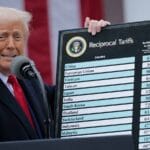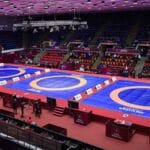- Tesla leads Cars.com’s American-Made Index since 2021.
- New 25% auto tariffs impact imported cars and parts starting April 3, 2025.
- Tesla’s US-based production shields it partially, but 20-25% of its components are imported.
- A Tesla vandalism lawsuit highlights growing tensions around the EV maker.
Tesla’s Competitive Edge Amid Tariff Changes
Tesla has long been celebrated for its American-made credentials, dominating Cars.com’s American-Made Index since 2021. With final assembly and major components produced in the U.S., Tesla has positioned itself as a leader in domestic manufacturing. However, the newly announced 25% tariffs on imported cars and car parts, effective April 3, 2025, present a new challenge for the electric vehicle (EV) giant.
According to Patrick Masterson, lead researcher for Cars.com, Tesla’s vehicles score as high as possible on the index, thanks to their U.S.-based production. “Tesla’s final assembly, engine country of origin, and battery origin are all based in the United States,” Masterson told CNN. However, even Tesla is not entirely immune, as 20-25% of its components are imported, according to an October 2024 National Highway Traffic Safety Administration (NHTSA) document.
Tariffs and Their Industry-Wide Impact
The tariffs, announced by the Trump administration, are expected to increase car prices by $4,000 to $12,000, depending on the vehicle. While Tesla’s reliance on U.S. manufacturing gives it an edge over competitors like General Motors and Toyota, which import significant parts from Mexico and Japan, analysts predict challenges ahead. Wolfe Research estimates a potential annual cost increase of $1.6 billion for Tesla due to components sourced from Mexico.
Elon Musk, Tesla’s CEO, acknowledged the impact, stating on X (formerly Twitter), “Important to note that Tesla is NOT unscathed here. The tariff impact on Tesla is still significant.”
Growing Tensions Around Tesla
Beyond economic challenges, Tesla has faced increasing social tensions. A lawsuit filed by a Tesla owner against Rafael Hernandez, who was caught vandalizing a Tesla Model X using Sentry Mode, highlights the growing hostility toward the brand. The lawsuit seeks $1 million in damages, setting a precedent for addressing such attacks.
Instances of vandalism targeting Tesla vehicles and showrooms have been on the rise, with perpetrators reportedly motivated by political and social grievances. The FBI and the Trump administration have implemented measures to address these incidents, but tensions remain high.
Looking Ahead
As Tesla navigates these challenges, its strong domestic manufacturing base provides a significant advantage. However, the complexities of global supply chains mean that no automaker, including Tesla, is entirely insulated from the new tariffs. The coming months will reveal how Tesla and the broader auto industry adapt to these sweeping changes.
Sources: CNN, BBC News, Teslarati











